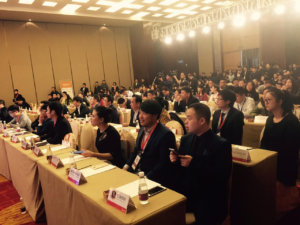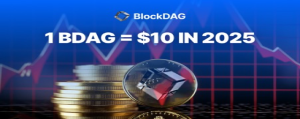Live from Shanghai: When the liquidity rush comes, China will dominate its own institutional and retail FX industry from within
China will have a self sufficient end to end FX industry ecosystem from Tier 1 bank level down to the retail trader very soon indeed, and it will be a massive, finely honed domestic market powerhouse

The Chinese retail FX industry is burgeoning.
We have all heard that before, several times, however this year will represent the very first time that the growth and development of the entire electronic trading ecosystem in this futuristic and leading edge nation will no longer be reliant on having a retail audience one side of the firewall, and the entire system that serves them including execution, client money and market connectivity on the free market side of the firewall.
Addressing 400 senior Chinese FX industry executives here at the annual FX conference hosted by YOCA in conjunction with FinanceFeeds here in Shanghai today to provide opinion and perspective on how this will transpire was FinanceFeeds CEO Andrew Saks-McLeod.
The only way to conduct research and gain full and detailed understanding of how the Chinese FX industry works from the ground up is to invest time and resources in spending time in China, in various provinces, with industry figures that will demonstrate how everything is structured, from retail traders’ relationships with all-important introducing brokers, right the way through to how connectivity to the markets and liquidity is provided.
FinanceFeeds has extensively traveled China, and has forged relationships with key entities in the country, hence at today’s FX industry conference, our opinion and perspective was proffered as a result of extensive and detailed research into the future direction of China’s retail FX business.
As the only non-Chinese executive here today, FinanceFeeds interaction with the audience was expertly translated by Yonglong Wu who is a Senior Sales Manager at Leverate’s Shanghai operations, as absolutely no English is spoken or written among Chinese officials, so domestic is its audience and entire business structure. Quite simply, China is such a powerhouse and such an economy in its own right, that it does not need to rely on any form of outside influences.
Liquidity provision and prime brokerage
Last year was most certainly a year in which the entire prime brokerage sector was subject to a massive amount of evolution in the Western world, largely due to the increasing demand from brokerages for the best possible execution and access to the most accurate pricing and trade processing environment, as well as the counteraction to this, which has manifested itself in the major Tier 1 banks having curtailed the extension of credit to OTC derivatives firms due to their extremely conservative approach to counterparty credit risk.

Indeed, Citigroup, the world’s largest Tier 1 FX dealer with over 16% of FX order flow by market share, produced a report in the middle of last year that indicated that the firm expected a 56% potential default ratio on OTC derivatives credit, causing the entire sector of interbank dealers to raise their capital requirements for brokers to be able to maintain prime brokerage agreements.
Just five years ago, it was possible to obtain a prime brokerage agreement with a capital base of just $5 million, but now it is almost impossible with $50 million and in some cases no deal will be done unless $100 million is on the table.
This matters for two important reasons when considering unlocking the massive potential of China’s retail business.
Firstly, Britain’s large interbank dealers are weary. Their non-electronic trading divisions such as mortgage and consumer credit lending entities have been battered by financial crises in the last few years of the previous decade, and have been subject to multi-million dollar fines for misselling of payment protection insurance, have been censured for benchmark rate corruption, and have lost billions in unpaid credit during the 2008 and 2009 credit crunch, which saw most of them having to be bailed out by the taxpayer.
This has created a situation in which the main Tier 1 banks are now ultra-conservative and are still licking their wounds by selling off retail divisions in their entirety, and restricting how much risk they take on counterparty credit extension to retail brokerages.
Complexity due to lack of credit and massive capital requirements? No problem in China
Meanwhile, brokers which have to face these counterparties have to stump up massive capital bases to maintain relationships with them and still be subjected to last look order execution on single-dealer platforms and then have to strike up relationships with further non-bank electronic communications networks such as EBS, Currenex, Hotspot FX and FXall in order to attempt to provide a more comprehensive liquidity solution against the banks’ pulling the rug out from under everyone’s feet.
The same brokerages are battling with this whilst focusing on mainland China, and its own restrictions toward allowing any transaction over $50,000 (which is nothing because most brokers have an omnibus account or a prime brokerage agreement and have to send much higher figures than that each month to overseas banks of the brokers they work with) out of the country for the purposes of derivatives trading.
As of last week, all transactions over $50,000 are subject to a client signature to document the purpose of the transfer. If it is for derivatives trading of any kind, it is no longer allowed.

Just as this is happening, China’s own banks, all of which are owned by the state, are massively well capitalized and have a very clever model indeed.
They do not expose themselves to risk, and they have assets which consist of property, cash, investments in company stock and indices that are so enormous that it is hard to quantify.
These banks, unlike the weary western banks, will extend counterparty credit to FX brokerages in China without the blink of an eyelid over risk.
Western banks are already wounded enough and are restricting what they can see quite transparently. It would be futile for a Western prime broker with no presence in mainland China to go to a Western bank’s eFX desk and ask for a large prime brokerage deal because of a massive Chinese partner that has been onboarded.
There is no way for the bank to check how large and how well capitalized that firm is, as one is one side of the firewall, and the other is, well, the wrong side.
The answer would be no.
For Chinese banks, offering Chinese liquidity to Chinese prime of primes and then distributing aggregated feeds to Chinese FX brokerages, the sky is the limit and this single factor, when it unfolds and is in place on a widespread scale, will cause the Chinese FX industry to absolutely mushroom in volume and power.
Prime of primes that have presence in China, that are not Chinese by origin, including Sucden Financial (HK) Ltd, Advanced Markets (Shanghai) and Saxo Bank’s APAC division will be able to participate very freely in this because they will be considered Chinese entities as they have their entire infrastructure based in China and therefore inside the firewall and under the all-seeing eye of the Chinese government.
Platform and integration technology
With a fully domestic Chinese ecosystem would come Chinese price feed and infrastructure technology, meaning that a need will exist to host market connectivity, platform technology and market depth indicators that can connect to Chinese liquidity effortlessly by running on native Chinese servers and connected to local venues, with full transparency to the government.
The same would apply to payment channels in which clients can deposit and withdraw funds. Chinese IBs sending large sums of client assets to brokerages would be absolutely simple if the prime of prime and entire banking facility was hosted within China. We are very well aware of several large IBs from Shenzhen to Zhengzhou that regularly trade 90,000 lots per month and hold over $250 million in assets under management.
Do Chinese primes and Chinese banks want this business rather than see it flow outside? Yes they certainly do indeed.
Major platform developers such as MetaQuotes and Spotware Systems are already well and truly on the map in China, their foresight will do them the power of good when the entire Chinese system becomes completely domestic.
A particularly interesting development was last year’s creation of an IB portal by Spotware Systems on its cTrader platform, which finds and hosts IBs within the platform itself. This could well be a linchpin in China, where the retail FX industry is very business-to-business orientated in that it relies completely on IBs, as there is very little direct retail business.
Brokerage solution providers that have presence in China will be well positioned also. Leverate has an office in Shanghai, and has the remit of developing Chinese market-specific fully integrated brokerage systems from CRM to back office, to trading platform connectivity, all from within China. Similarly, Gold-i has an office in Shanghai.
Removing the barriers
Let’s look very simply at the barriers that western banks face.
Credit is very hard to obtain for OTC firms
Banks are browbeaten following several financial crises
Risk management is a huge concern
Transparency when extending credit and working with Chinese counterparties is impossible, and any Yuan based transaction is impossible to value or clear on an open market
Infrastructure is subject to continual blocking and capital bases are hard to define
Now let’s look at the barriers Chinese banks face
When facing Chinese counterparties and providing services to Chinese brokerages, there are no barriers whatsoever.
Barriers in China only exist between the mainland and the rest of the world. Inside China, the entire system is controlled and supervised by government departments that connect all components together and can see everything clearly.
The banks are not alone. The government, which has enormous business acumen and purchasing power, is right behind them, driving them forward just as it would do for primes and retail brokerages.
At the conclusion of this particular presentation, several executives in the Chinese FX industry as well as heads of Chinese divisions of Western firms with their headquarters here in Shanghai concurred and agreed.
Therefore, the future for the entire commercial structure of the Chinese industry is, well, Chinese.









